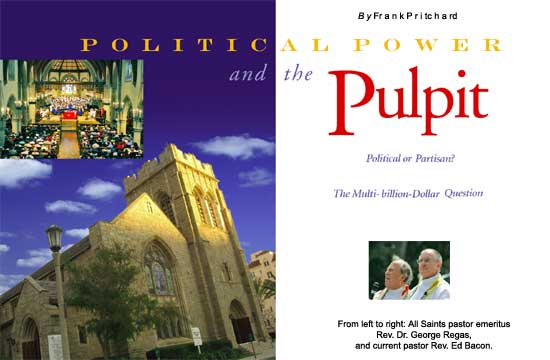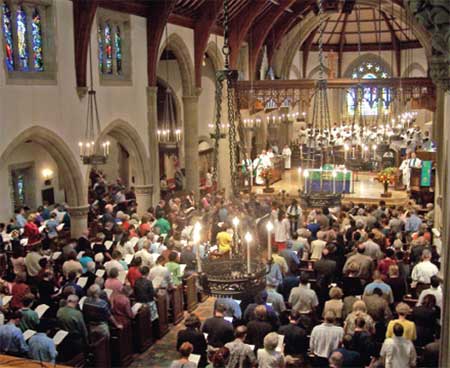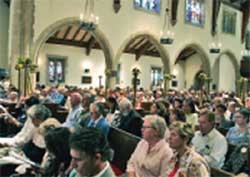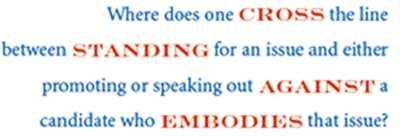Political Power and the Pulpit
Frank Pritchard January/February 2007
Getting your Trinity Audio player ready...

The other day I heard something on the car radio that made me think that I had somehow passed through a wormhole and entered into an alternate universe. It was a National Public Radio report about a church that was in danger of having its tax-exemption status revoked because of partisan politics from the pulpit. Having always had an interest in church-state separation issues, I just assumed it was the usual fare: i.e., a right-wing pastor in Podunk openly attacking some hapless Democrat as a baby-killing, demon-worshipping, gay-loving infidel who needed to be defeated in the upcoming election to avoid God's wrath falling on America—or something of the sort. The next thing I heard was Barry Lynn, of Americans United for Separation of Church and State; again, knowing AU (and Barry), I was expecting the usual spin from him about how we need to keep churches from violating the laws regarding 501 (c) (3) tax-exempt status. In other words, I just assumed that Barry Lynn and AU were the ones who had filed suit against the church, and Barry was being interviewed about his latest success.
Instead (and here's where I thought I was losing it), Barry Lynn was complaining about what the IRS was doing to this church. The gadfly of the Christian Right, the ceaseless watchdog that since the 1990s has been filing lawsuits against churches that he accuses of having crossed over the line between speaking out on issues and openly pushing a partisan agenda!
After a few more seconds of listening, I started getting the picture. Now, not that I want to be cynical or anything, and certainly I don't want to accuse AU of having its own political bias, but once I realized that the church in question was decidedly left-wing, and about as far removed from the Christian Right as possible, did it all start making sense.
Either way, though, left-wing, right-wing, middle-left-right-wing, the story of the All Saints Church's run-in with the IRS is another example of the endless struggle that churches have regarding politics. And that's because religious organizations, especially churches, by nature are deeply involved with moral issues. Yet because so often political issues are moral in essence and tone, churches need to speak out on the political issues of the day. The million-dollar question, actually the multibillion-dollar question (since churches, by not paying taxes, have saved billions over the years), is How can churches speak out on these issues, and yet not violate the tax code provisions that give them their exempt status?
The All Saints Church
The All Saints Church of Pasadena, California, traces its roots to a small gathering of parishioners in a family home in 1882. It eventually incorporated as a parish in April 1886, and in 1889 the first church was constructed on its present site, where it now has 3,500 active congregants. It is, perhaps, the largest Episcopal church west of the Mississippi. Its vision statement reads, in part: "To live out Christ's vision of unlimited love that empowers new life, not only for children, youth and adults within our membership, but with other neighbors, especially those who suffer from violence, injustice and bigotry."
The church has also been actively involved in the social issues that it feels called by God to deal with. It refers to itself as a "peace church," and its mandate calls it "to embody God's unlimited and inclusive love that embraces, liberates and empowers people. At the center of our baptismal covenant is the call to live out the universal mission of the gospel. To this end, we commit ourselves to actions of peace, justice and love that empower new life for the whole human family."
For the All Saints Church, this commitment has been manifested in overtly political ways. The previous rector was one of the first clergymen in the United States to openly come out against the apartheid regime of South Africa (Desmond Tutu, a longtime friend of the church, has spoken at All Saints twice in 2006). The church was one of the first large ones to oppose the Vietnam War. Another rector, in 1942, stood on railroad tracks in an attempt to block trains that were bringing Japanese-Americans to internment camps after Pearl Harbor. In 1991 it was the first church in the United States to bless same-sex unions (its Web site says that it "recognizes the multiple needs of gay and lesbian Christians and is fully committed to a ministry that meets them. We welcome gays and lesbians enthusiastically into our parish life and work"). It's also pro-choice and vehemently opposed to the war in Iraq.
In short, it would not be a stretch to call All Saints, politically speaking, liberal.
The Sermon
Of course—liberal, conservative, reactionary—a church's political leaning is none of the IRS's business. What, then, caused the letter to be sent to the church dated July 24, 2006, with a list of questions that needed to be answered in order to determine whether or not All Saints violated the requirements of the 501(c)(3) code. According to the letter itself, it was a sermon by a visiting pastor, the former rector actually, that has raised the IRS concern. Said the letter: "We have received information that on October 31, 2004, the Reverend George T. Regas delivered a sermon at All Saints Church that took a position in opposition to candidate George W. Bush and in support of candidate John Kerry, two candidates for the office of the President of the United States in the 2004 election."
The sermon was delivered by Reverend Regas, the rector emeritus of All Saints, a few days before the 2004 election. It was titled "If Jesus Debated Senator Kerry and President Bush." And though right out the gate Reverend Regas said that "I don't intend to tell you how to vote," it was clearly a very antiadministration homily.
A few excerpts from his mock debate between Jesus and Bush and Kerry:

Then, during his sermon, Reverend Regas said to the congregation: "When you go to the polls on November 2nd—vote all your values. Jesus places on your heart this question: Who is to be trusted as the world's chief peacemaker?" And then, again: "When you go into the voting booth on Tuesday, take with you all that you know about Jesus, the peacemaker. Take all that Jesus means to you. Then vote your deepest values."
The Tax Code
Reverend Regas's sermon, and the ensuing IRS letter, raise a number of questions. Though this was, unquestionably, a political sermon, was it a partisan one? Can one be political and not partisan, especially when political issues are so often partisan? And why was it preached a few days before the presidential election, which it referred to twice? At the same time, however clearly against administration policies the sermon was, what happens to free speech, especially political speech (which some have argued is the only speech the framers intended to protect) if you're going to have the IRS come down your throat if you speak out against the policies of the incumbent regime?

According to the tax laws regarding the involvement of churches and political issues, houses of worship and religious leaders may address political and social issues, but federal tax law bars most nonprofit groups from endorsing or opposing candidates for public office. Churches, temples, and mosques must refrain from outright electioneering. Just what, however, is "outright"? According to Americans United, "Under the Internal Revenue Code, all IRC section 501(c)(3) organizations, including churches and religious organizations, are absolutely prohibited from directly or indirectly participating in, or intervening in, any political campaign on behalf of (or in opposition to) any candidate for elective public office."
Ulterior Motives?
The problem, however, is where does one cross the line between standing for an issue and either promoting or speaking out against a candidate who embodies that issue?
"We are a political church," said All Saints director of Communications, Keith Holeman, "but we are not a partisan church. And we're not against the IRS code, but we have to speak out on our core values, such as the war in Iraq. And that's what Reverend Regas did."

Of course, one could argue that the timing of Reverend Regas's sermon didn't help matters (had the same sermon been preached two weeks after the election, I might not be writing this article). On the other hand, questions have been raised about the timing of the IRS notice to All Saints, which came just a few months before the midterm elections of 2006. Folks have wondered, was this some kind of warning shot by the administration to churches that might not be favorably inclined toward government policies?
In the past, particularly since the rise of the Christian Right, conservative churches have in some cases all but become campaign centers for the GOP. This was patently obvious in the past few elections. Some churches issued voter guides that showed how their own religion was in harmony with the policies of the Bush administration. Several Roman Catholic bishops suggested before the 2004 election that a vote for John Kerry would be a sin. In the run-up to the 2006 elections, Americans United sent out letters warning houses of worship that an effort by James Dobson's Focus on the Family to mobilize "activists to work in eight battleground states to mobilize evangelical Christian churches before the November elections" could be crossing the line regarding what's legitimate political activity for churches. Thus, one wonders, why has the IRS left the churches heavily involved with Dobson's politicking alone, while coming down on All Saints for one Sunday morning sermon?

"What perplexes me about All Saints," said Barry Lynn of Americans United, "is that I have never heard of a church being asked to undergo such a sweeping, broad and deep investigation on the basis of a complaint about a single sermon by a guest speaker."
The Challenge
No doubt, the leaders of All Saints are perplexed about that as well. Which explains why, at a press conference on September 21, 2006, All Saints announced that it will challenge the IRS request: "The vestry of All Saints church in Pasadena, California, voted unanimously this morning to challenge legally, and in a court of law, the right of the Internal Revenue Service to proceed with either of the two summonses served on the church by the IRS last Friday. The 26-member governing board of All Saints reached its conclusion after much prayer and consultation with its congregation, clergy, and legal counsel."
Though this is just one church, the issues remain big: how and when can churches speak out on the great moral and political issues of the day, and do so without the threat of government intimidation? For the revoking of tax-exempt status is, unmistakably, just that—intimidation.
Frank Pritchard is a freelance journalist writing from Washington, D.C.